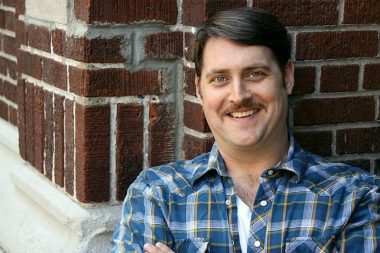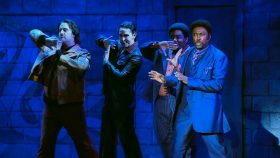Being a successful theater actor in New York isn’t easy. Just ask Todd Horman ’94, the first graduate of Elon’s music theatre program who has managed to stay in the business thanks, in part, to Professor of Performing Arts Cathy McNeela, a mentor and friend who taught him the ropes 24 years ago.
 By Gabriela Szewcow ’13
By Gabriela Szewcow ’13
Months before Todd Horman ’94 landed a role in the Broadway production of Priscilla, Queen of the Desert in 2011, he found himself in a rut.
He was 38 years old and his expectations for returning to Broadway were not exactly high. Still, hoping to reignite his career, he convinced himself to attend a dynamic workshop class. There, he encountered actors of all ages, including a younger woman who graduated from Elon.
“One day during class, the instructor told the young woman, ‘There’s someone in this class who paved the way for you,’ and she pointed at me,” Horman recalls. The instructor went on to say the woman was in that class, in some way, because of him—the first graduate of Elon’s music theatre program. The comment resonated and for the first time, he began thinking about how far he had come.
Back at Elon, there is someone who has never doubted Horman’s talent. Cathy McNeela came to Elon from New York City, where she was working as a singer, actor and dancer, to launch the music theatre program in 1990. It was Horman’s first year at Elon, too. They met during drop/add day in the old gymnasium, an encounter McNeela will never forget. “I can still see him walking up to the table to sign up for voice lessons,” she says. Since then much has happened to both Horman and the program McNeela helped establish. While the program has expanded to include 20-25 students in each graduating class, its first graduate has managed to amass a successful career along the way.
Getting in ‘the club’
Horman came to Elon thinking he would take a different path (math and business were high on his list), but soon found voice lessons and the school’s musical productions more appealing. Coming from a family of musicians, he grew up performing in musicals, but he didn’t think of music theater as a career until after a month and a half of voice lessons with McNeela. “The seed had been planted in high school but Cathy is the one who watered it,” he says.
 For McNeela Horman was the perfect student, one who had talent and was willing to follow her advice. “He was like a sponge,” she says. She was so impressed by the young man from Maryland that when she met his parents during Family Weekend his first year, she told them she was certain he would find great success in the music theater business. She was right, though success did not come right away.
For McNeela Horman was the perfect student, one who had talent and was willing to follow her advice. “He was like a sponge,” she says. She was so impressed by the young man from Maryland that when she met his parents during Family Weekend his first year, she told them she was certain he would find great success in the music theater business. She was right, though success did not come right away.
Shortly after graduation, Horman moved to New York to study opera at the Manhattan School of Music. During those early years, he scrambled to find work, an agent and a union card, and struggled to determine what area of show business he fit into. After more than a year of studying and living in the city, he felt like something wasn’t clicking. He moved to Las Vegas to pursue a master’s degree in music theater from the University of Nevada, Las Vegas, but returned to the New York area three years later. That’s when he started to get more call backs from producers of musicals, plays, television and films. Urinetown, The Musical was his first big Broadway role; he auditioned for the part of Robbie the Stockfish in 2002 after a cast member was injured. His agent called right after the audition to give him the good news and he started rehearsals that same afternoon. “That was my introduction to the Broadway scene,” Horman says, “and it was exhilarating.”
Horman’s three weeks in Urinetown gave him the break he needed. The part led to his participation in the show’s national tour in 2003, but he would have to wait eight more years before returning to Broadway in Priscilla, which allowed him to form meaningful and lasting relationships with casting directors that later opened doors for more auditions and jobs. “Priscilla was life-changing,” he says. “It let people know that I belong in the club.”
Growing steadily
While Horman was fighting to make a name for himself in New York, McNeela continued working with her colleagues to improve the music theatre program at Elon. In addition to developing that program’s curriculum, she helped create the acting, theatre studies, design and technology (now theatrical design and production) and dance programs in what was then the fine arts department. The additions laid the foundation for today’s Department of Performing Arts, whose 30-plus faculty offer a robust number of majors and minors. The ranks of music theatre alumni have also grown from one in 1994 to 279 in 2014. “The quality of the program and the training provided by our highly experienced faculty has always been impeccable,” she says, “and the students have been at an extremely high caliber since our beginning.”
This dedication to excellence has resulted in national recognition. In The Princeton Review’s 2014 “The Best 378 Colleges” guidebook, Elon was ranked No. 13 for its theatre program. Last year Backstage.com, one of the most popular websites for theater auditions and news in the country, included the department as one of the six programs for college actors on a budget. While the accolades validate decades of hard work, for McNeela there is no better endorsement of the program than the success of its alumni. They can be found at the nation’s top graduate programs, on Broadway, in dance companies, on national and regional tours, on television series and in national commercials. Two alumni have also received Tony Award nominations. It’s not surprising that competition to get into the program is fierce. Of the more than 500 students who auditioned for the program this year, only 20 were admitted.
“This program is great because of the amazing teachers but also because of people like Horman,” McNeela says. “He’s part of this beautiful fabric of Elon’s music theatre program that has been woven and spread across the nation by alumni like him, whose work and success continually inspire students to pursue the same quality of training and discipline that is so apparent in all of our alumni.”
After 24 years, Horman and McNeela remain close. McNeela cannot contain the tears when she talks about him. She describes him as one of her best friends. “It’s fitting that he was the first music theatre graduate to come out of Elon, and the first one to be on Broadway, and it’s no surprise he’s still making a living doing it,” McNeela says. “Seeing him do this thing that he has loved his whole life, and has worked so hard at, is just wonderful.”
Finding success
Without a formal showcase, the auditioning practice commonly employed by most musical theater programs today, Horman’s transition into the business involved a lot of legwork. He has learned to change and adapt over the years, and he thinks that’s what has kept him in the field. “I feel like not being handed stuff immediately when I got here made me pretty resilient, it made me much more patient,” he says. Now in his 40s, he primarily makes his living performing in musicals, though he also does some voiceover work. He has always known that as an actor, his job is to audition. In fact that was the best piece of advice McNeela ever gave him: to learn how to audition.

Seeing Horman on stage has been an exciting and exhilarating experience for McNeela. She enjoyed his performance in Durham, N.C., last year in the national Sister Act tour, laughing until she cried. During a trip to New York, she made sure to see Horman perform in high heels as Leather Bear in Priscilla. She has watched him mature and grow into his own type, and now that he’s found his place in the character world, she is looking forward to seeing him shine in future roles.
Meanwhile Horman is enjoying his next big performance in Sting’s musical, , which premiered in Chicago and opened in October on Broadway. Singing a Sting song in front of Sting is not the easiest thing to do, so he’s learning to adapt and change gears again—a skill that has kept him afloat in the unforgiving world of musical theater. He encourages students following in his footsteps to keep their heads up, to try not to take rejection personally and to keep showing up. “If it’s in your blood, it’s in your blood, so you’ve gotta give it a shot,” he says.
While his resilience and willingness to adapt have allowed him to thrive in show business, his lasting friendship with and support from his college voice teacher has been a great benefit. “There’s something about Cathy, and all the positive support she’s provided,” Horman says. “She let me find my own voice, she let me find my own way, and she is still to this day one of my best friends.”


